From ‘they’re eating the dogs’ to ‘childless cat ladies’: The most memorable comments of the US election campaign
The 2024 race will be remembered for its increasingly crude and violent rhetoric — from outbursts to insults, from pseudo-brilliant moments to pearls of wisdom
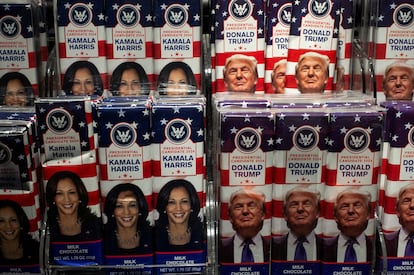

We know when U.S. presidential campaigns end, but not always when they begin. This is how it is in an severly divided country that is immersed in an insane and perpetual election cycle. This particular campaign, which pits Democratic Vice President Kamala Harris against Republican candidate Donald Trump, ends on Tuesday and the race seems so tight that everything indicates that the winner will be determined in a photo finish.
And while it is not clear when the campaign started — whether with the presentation of Trump’s candidacy in November 2022 or with Joe Biden’s announcement in April of the following year that he would seek re-election — it is possible to establish its turning point: June 27, when a debate was held in Atlanta that pitted both candidates against each other, in a spectacle that raised alarm bells about the president’s physical and mental abilities to run again and ultimately led to his decision to withdraw from the race.
That day marks the beginning of this journey through the most memorable comments of the most atypical campaign in recent history, which will be remembered for its increasingly crude and violent rhetoric — from outbursts to insults, from pseudo-brilliant moments to pearls of wisdom. A crazy roller coaster with twists as unexpected as the decision not to pursue a presidential reelection for the first time in half a century, two assassination attempts and the meteoric rise of a candidate in whom few trusted given her performance as vice president.
“We finally beat Medicare”
Eleven minutes into that night in Atlanta, Biden got lost in a labyrinth of his own making in a speech that made no sense and ended with nonsense: “We finally beat Medicare,” he said, naming the public health system when he meant to talk about the Covid pandemic. “I don’t think he even knows what he’s saying,” Trump said after a while.
It was a disastrous night, which ended up being summed up in one word: panic. That was what the Democrats felt when they saw that their helmsman was steering the ship straight towards an iceberg. The voices calling for his resignation, from media editorials to commentators, from party bigwigs to the little guys, ended up twisting the candidate’s arm, and Biden announced that he was giving up his efforts with a letter released on July 22 in X: “It is in the best interest of my party and the country for me to stand down,” he wrote.
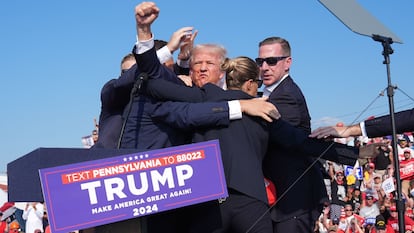
“Fight, fight, fight!”
At around 6:11 p.m. on July 13, the unthinkable happened: a bullet fired by a sniper named Thomas Matthew Crooks, a 20-year-old whose motives remain unclear, missed Trump by 0.6 centimeters. It grazed his right ear, and the candidate fell to the ground. Several Secret Service agents, who are in charge of the former president’s security and who that day exhibited one of their most disastrous actions in decades, ran to cover him with their bodies. Within seconds, Trump emerged from among the pile of people and, in a phenomenal act of political instinct and mastery of the rules of posterity, raised his fist and mouthed: “Fight, fight, fight!” The phrase, like dozens of other Trump statements apparently born of improvisation, became a slogan of his campaign and a rallying cry for his followers. It has not stopped resounding in the hundreds of rallies that he and his followers have given since then.
“I was shot in the name of democracy”
Two days after surviving an assassination attempt at an open-air rally in Butler, Pennsylvania, the Republican National Convention began in Milwaukee, which served to certify the party’s total surrender to the wishes of Trump and his family. It also served to select a vice presidential candidate: Ohio Senator J. D. Vance. Trump spent the convention with a bandage on his ear, showing that something deep had changed in him and that he was ready to bury his tendency to stir up confrontation between Americans. It took only 20 minutes of his lengthy acceptance speech for that mirage to disappear and for the old Trump to return, angry and resentful as always. That weekend he crossed Lake Michigan to give a rally, his first with Vance. There he said: “I took a bullet for democracy,” a phrase that entered his repertoire, before fading away as the weeks went by.
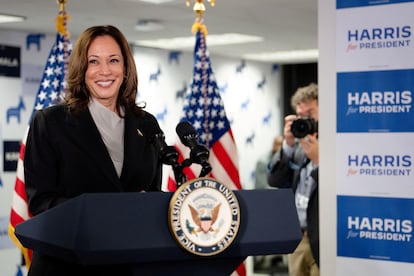
“When we fight, we win”
Following Biden’s resignation and his declaration of support for his vice president as the candidate to succeed him, a few heart-stopping days began, as well as the rain of money from millions of donors and an outpouring of support from volunteers. It was quickly clear that Harris would have the support of the party. The speeches by the new surprise candidate also began. Among the first leitmotifs of her nascent campaign was the contrast between her opponent, a criminal convicted of 34 felonies, and herself, who was a criminal prosecutor in the city of San Francisco between 2004 and 2011 and attorney general of California (2011-2017) before becoming a senator and, later, the vice president.
“I took on perpetrators of all kinds,” she said, alluding to her judicial experience, the day after Biden resigned from the Delaware headquarters of the president’s re-election campaign. “Predators who abused women. Fraudsters who ripped off consumers. Cheaters who broke the rules for their own gain. So hear me when I say, I know Donald Trump’s type. And in this campaign, I will proudly, I will proudly put my record against his.” At that event, she also appropriated an old phrase that became one of her campaign slogans, “When we fight, we win,” words that a month later would serve as a closing speech at the Democratic National Convention in Chicago with which she accepted the party’s nomination. Other slogans include: “Freedom,” “A new way forward” and “We are not going back.”
“The best way to move forward is to pass the torch to a new generation”
Halfway through that week, which at times seemed like a century, Biden appeared in the Oval Office on July 25 to justify his resignation before his compatriots. He sold it as an act of sacrifice in the name of democracy and as a way “to pass the torch to a new generation.” It was a brief speech, just over 10 minutes long, and somewhat somber, lacking the drama and surprise element of its most direct antecedent: the words with which Lyndon B. Johnson renounced running for office again, just months before the 1968 election. No president had done anything like that since. Biden looked in the magnifying mirror of Franklin D. Roosevelt and George Washington, and cited Benjamin Franklin’s definition of the United States as a warning to voters: “A republic, if you can keep it.”
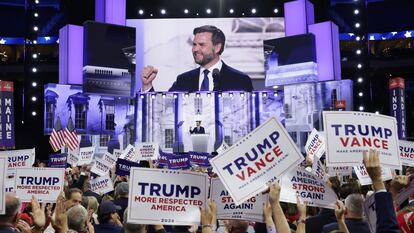
“A bunch of childless cat ladies”
This is the oldest line in the lot, but it deserves a mention given the notoriety it achieved within days of the news that Trump had chosen as his running mate J. D. Vance, a senator from Ohio and the best-selling author of Hillbilly Elegy, a memoir by the son of an opioid addict who is raised by a tough-cookie Kentucky grandmother. The statement was taken from a 2021 interview with then-Fox News host Tucker Carlson. Vance was campaigning for his Senate seat, and, in tune with Carlson’s demagogic tone, he complained that the United States is governed by a cabal made up of Democrats, corporate oligarchs and “a bunch of childless, cat-loving ladies who are miserable with their own lives and the choices they’ve made, and so they want to make the rest of the country miserable, too.” He was referring, he went on to specify, to personalities such as Congresswoman Alexandria Ocasio-Cortez, Harris herself, or Transportation Secretary Pete Buttigieg.
“The entire future of the Democrats is controlled by people without children. And how does it make any sense that we’ve turned our country over to people who don’t really have a direct stake in it?” The misogynistic reference lit up the internet, and became an ideal slogan for t-shirts of women proud of their decisions. It was also the first stone in a wall that was being built between Trump’s campaign and the female vote, which could cost the Republican candidate the presidency.

“There are weird people on the other side”
Once the question was resolved of whether Democrats would support Harris, an unpopular vice president and a candidate quickly forgotten when she ran in the party primaries in 2019, the question arose of who she would choose as her running mate. Ultimately, she settled on Tim Walz, governor of Minnesota. The message was clear: a simple man from the Midwest, a region that includes two of the seven decisive states (Michigan and Wisconsin). A school teacher and football coach without the ambitions of Washington politicians.
In addition to all these traits, considered ideal to conquer so-called “Middle America,” a statement Walz made on television was decisive: “These are weird people on the other side. They want to take books away. They want to be in your exam room.” He was alluding both to the Republican tendency to ban books and to attacks on women’s reproductive freedom. Moreover, everything seems to indicate that he was unintentionally pointing out a path: after eight years of attacking Trump as a threat to democracy, the time had come to make fun of him. Given the success, at least initially, of the new strategy, it is difficult to understand why it took so long to come up with it.
“And then there is his obsession with crowd size”
The Democratic convention, held in mid-August in Chicago, served to demonstrate at least two things: that the party was hopeful and enthusiastic, united around the idea of Harris’s candidacy, and that it can make use of the bench, unlike the Republicans, so absorbed in the personality of their leader that the fumigation of the party’s memory has already been completed. The Clintons, the Obamas, Bernie Sanders, Nancy Pelosi, Ocasio-Cortez, several governors and a handful of celebrities, including an NBA coach, Steve Kerr, took the stage to motivate their supporters. These were also days in which the party, riding on the back of Walz’s previous phrase, stopped worrying and went on the attack with humor, without fear of ridiculing their rival.
There were many memorable phrases from the convention, but the spirit is perhaps not better summed up by any other than the gag that former president Barack Obama uttered. It was a visual gag, one that needs to be accompanied by a video of Barack Obama suggesting that Trump is obsessed with his manhood. The key was not so much what he said (“There’s the childish nicknames, the crazy conspiracy theories, this weird obsession with crowd sizes”) but how he said it, bringing his hands together and apart with great mastery of comedic timing. It was not the first time Trump had been reminded that size might matter. In the 2016 Republican primaries, Florida Senator Marco Rubio said of him that he had “small hands,” slipping in a not-so-elegant comparison with other parts of his anatomy.
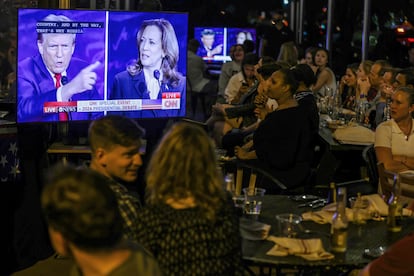
“They’re eating the dogs”
On September 10, the first and only debate between the presidential candidates was held. It ended with a clear victory for Harris, but Trump took the consolation prize of the biggest outrage of the night. They were talking about immigration, when he decided to echo (in front of 60 million people who watched the face-to-face on television and hundreds of millions more who later consumed it cut into short videos) a baseless conspiracy theory that was circulated by accounts linked to a neo-Nazi group. According to this theory, Haitians living in Springfield, Ohio are eating their neighbors’ pets. “They’re eating the dogs, the people that came in, they’re eating the cats. They’re eating the pets of the people that live there, and this is what’s happening in our country, and it’s a shame,” said Trump. It might have been laughable (one South African producer thought so and turned the quote into a song), but it fueled racist hatred in that corner of the Midwest, where coexistence was damaged and threats against Haitians began. Some have chosen to leave.
“That is a damning nonanswer”
The debate between the vice presidents on October 1 was a low point for the Democratic campaign. In the middle of a crossfire of politeness typical of two Midwesterners, Vance managed to sweeten his image and sell himself as someone who, for example, would never have said he would defend a national veto on the right to abortion (he did). Walz was seen in a hurry and he fell into his opponent’s traps, but at least he managed to land a good blow at the end of the match, when it came to talking about the assault on the Capitol. The Republican refused to expressly condemn the insurrection, because, he said, his thing is to look to the future. “That is a damning nonanswer,” shot back Walz.

“I’m not just a MAGA, I’m a dark MAGA”
The strangest addition to the campaign involves the richest man in the world, Elon Musk. Not only has he donated generously to Trump (at least $75 million) and organized a million-dollar-a-day giveaway among his supporters that is dangerously close to being an election crime; the owner of Tesla, SpaceX and X has also held rallies in Pennsylvania, the mother of all decisive states. Before hitting the road, he accompanied the candidate to the rally he gave on October 5 in Butler, the place where he suffered his first assassination attempt. Musk came bounding in, dressed all in black, a cap with gothic letters included, and said, before joining in on all the headliner’s lies: “I’m not just MAGA, I’m dark MAGA.” MAGA is, of course, the acronym for Make America Great Again, the great slogan of Trumpism that calls for returning a supposed lost greatness to the United States. And since we’re talking about phrases, this is surely the one that, for the third consecutive American election, has been heard the most times in this campaign.
“There is not a thing that comes to mind”
If Harris ends up losing the election, these words will likely haunt her for the rest of her life, reminding her of her defeat. She spoke them on October 8 during a friendly interview on the ABC program The View, where she was asked to reflect on her tenure and, perhaps, engage in a bit of self-criticism. When prompted on what she would change about her time as Biden’s vice president if she could start over, Harris hesitated, made a face, and said she couldn’t think of anything specific. This moment proved to be an unflattering summary of the challenge that had shadowed her since the start of her candidacy — and even earlier, during those anxious days when she watched Biden’s administration struggle under heavy criticism.
The dilemma was clear: how could she distance herself from one of the most unpopular presidents in U.S. history without appearing disloyal, while simultaneously positioning herself as a candidate for change, despite being a central figure in the administration? That remark was the worst possible misstep for achieving this balance. Since she made it, it has featured prominently in Trump campaign advertisements. By October 16, in a tense interview with Fox News, Harris had learned her lesson. She firmly declared: “My presidency will not be a continuation of Biden’s presidency.”
“Enemies from within”
“The crazy lunatics that we have — the fascists, the Marxists, the communists, the people that we have that are actually running the country... Those people are more dangerous — the enemy from within — than Russia and China and other people,” Trump said at a rally in Wisconsin. This rally came on the heels of his second assassination attempt, orchestrated by a man named Ryan Routh, who was arrested near Trump’s West Palm Beach golf club while armed.
Trump later echoed these sentiments during interviews with Fox News, telling host Maria Bartiromo, “The enemy from within is more dangerous” than countries like Rissia, and suggesting that it may be necessary to deploy the military on American soil to fight these forces.
On October 20, Trump sharpened his accusations, naming Democratic Representatives Adam Schiff and Nancy Pelosi specifically: “These are bad people. We have a lot of bad people. But when you look at ‘Shifty Schiff’ and some of the others, yeah, they are, to me, the enemy from within.” Fox News host Howard Kurtz gave him an opportunity to clarify: “He’s a political opponent of yours, but is he an enemy?” Trump responded emphatically, “Of course he’s an enemy, he’s an enemy.”
These biting remarks provided fuel for Harris’s campaign in its final phase, inspiring one of her key slogans: “Trump has an enemies list. I have a to-do list.”
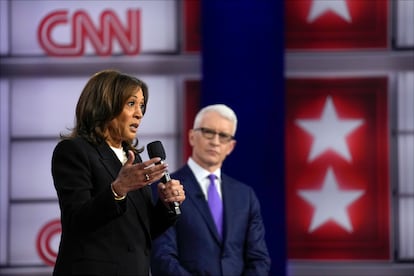
“He certainly falls into the general definition of fascist”
John Kelly, who served as Trump’s chief of staff for the first half of his term, shared a striking critique in a series of conversations with The New York Times published on October 22. Kelly, who managed to endure one of the longest tenures in a White House marked by relentless turnover under a president famed for his reality TV catchphrase, “You’re fired!” told the newspaper: “Looking at the definition of fascism: it’s a far-right authoritarian, ultranationalist political ideology and movement characterized by a dictatorial leader, centralized autocracy, militarism, forcible suppression of opposition, belief in a natural social hierarchy [...] Certainly the former president is in the far-right area, he’s certainly an authoritarian, admires people who are dictators — he has said that. So he certainly falls into the general definition of fascist, for sure.”
These revelations added significant fuel to the Harris campaign. Following Kelly’s comments, Harris said that it was “deeply troubling and incredibly dangerous that Donald Trump would invoke Adolf Hitler.” With only two weeks left before election day, the tenor of the campaign’s rhetoric intensified dramatically on both sides. The very next day, at a town hall meeting moderated by CNN’s Anderson Cooper, Harris was asked directly if she believed Trump was a fascist. Her response was unequivocal: “Yes, I think he is.”
“I want to cancel my subscription”
This phrase didn’t come from any politician, television analyst, or polling expert. Instead, it was echoed by approximately 250,000 readers who, according to The Washington Post, canceled their subscriptions following the newspaper’s decision to break with tradition and refrain from endorsing any presidential candidate in an editorial. Although this choice was framed as impartial, in practice, it mainly affected potential support for Kamala Harris. The decision came from the paper’s owner, Jeff Bezos, a billionaire not shy about exerting influence on American society, and was made despite opposition from the editorial staff.
The fallout was significant: the move triggered a wave of columnist resignations and criticism from prominent figures associated with The Post’s storied history. This shift wasn’t unique to The Washington Post; other major publications, including The Los Angeles Times, USA Today, and the Tampa Bay Times, also opted not to endorse any candidate this cycle.
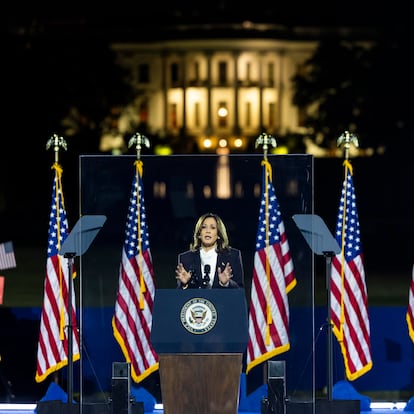
January 6 “was a day of love”
This striking statement reflects the ongoing effort by the Republican campaign to whitewash the events of January 6, 2021 — a day that stands as one of the darkest in modern American democratic history. In the weeks leading up to the election, this narrative has been amplified. On October 30, Kamala Harris held the most symbolic rally of her campaign, addressing a crowd of approximately 75,000 at the Ellipse, with the south facade of the White House serving as her backdrop. In response, Trump said that January 6 “was a day of love.”
Harris’ choice of location was pointed; it was from that very spot that Trump had incited a crowd of supporters on January 6 to disrupt the peaceful transfer of power to President-elect Joe Biden, fueled by false claims that the 2020 election had been stolen. The FBI later classified the attack as an act of domestic terrorism. The violence that ensued left around 140 police officers injured, with three rioters and one officer killed in the attack. Hundreds of rioters have since been incarcerated for their actions. Trump has described these individuals as “hostages” and “incredible patriots,” promising pardons if he regains the presidency.

“Whether the women like it or not, I’m going to protect them”
In the final full week of the campaign, Trump fired off so many controversial remarks that many were left questioning whether it was a desperate attempt to alienate moderate voters or a calculated strategy to energize his predominantly male base, known for admiring his unfiltered approach. For example, he said: “Whether the women like it or not, I’m going to protect them,” citing alleged dangers such as “migrants coming in” and “foreign countries that want to hit us with missiles and lots of other things.” These comments were made on Halloween, when Trump, dressed as a garbage man, climbed onto a garbage truck in Wisconsin to respond theatrically to a disparaging comment made by Biden about Trump supporters.
The following day, in a more informal conversation with Tucker Carlson in Arizona, Trump targeted former congresswoman Liz Cheney, a prominent figure from a storied Republican family and a fierce critic who had announced her intention to vote for Harris. “Let’s put her with the rifle standing there with nine barrels shooting at her,” Trump said, referring to her as a “war hawk” and bringing up her father, Dick Cheney, the former vice president and architect of early 21st-century U.S. military interventions. Trump added: “Let’s see how she feels about it. You know, when the guns are trained on her face.”
“Garbage”
The final word dominating this campaign season is “garbage.” It was used two Sundays ago during a rally in New York marked by Trump’s racially and misogynistically charged rhetoric. At the event, comedian Tony Hinchcliffe, known for his abrasive humor, made headlines by describing Puerto Rico as a “floating island of garbage in the middle of the ocean.” This offensive remark outraged Puerto Ricans, who are American citizens. While they cannot vote in presidential elections unless they live in one of the 50 states, their influence could be significant enough to sway the outcome in states like Pennsylvania, where their numbers are substantial.
The fallout from Hinchcliffe’s statement triggered a surge of support for Harris from Puerto Rican celebrities, including Bad Bunny, Ricky Martin, and Jennifer Lopez. This wave of endorsement also coincided with a misstep from Biden, who, during a Zoom call with Latino voters, made an unfortunate comment: “The only garbage I see floating out there is his supporters.” Harris was quick to distance herself from Biden’s words, delivering a conciliatory speech in Washington aimed at healing divides.
The term “garbage” had actually entered Trump’s campaign rhetoric the week before. At an event in Tempe, Arizona — a crucial swing state — Trump described illegal immigration as turning the U.S. into a “garbage can” for people from all over the world. Amused by his own words, he added: “First time I’ve ever said ‘garbage can.’ But you know what? It’s a very accurate description.”
Sign up for our weekly newsletter to get more English-language news coverage from EL PAÍS USA Edition
Tu suscripción se está usando en otro dispositivo
¿Quieres añadir otro usuario a tu suscripción?
Si continúas leyendo en este dispositivo, no se podrá leer en el otro.
FlechaTu suscripción se está usando en otro dispositivo y solo puedes acceder a EL PAÍS desde un dispositivo a la vez.
Si quieres compartir tu cuenta, cambia tu suscripción a la modalidad Premium, así podrás añadir otro usuario. Cada uno accederá con su propia cuenta de email, lo que os permitirá personalizar vuestra experiencia en EL PAÍS.
¿Tienes una suscripción de empresa? Accede aquí para contratar más cuentas.
En el caso de no saber quién está usando tu cuenta, te recomendamos cambiar tu contraseña aquí.
Si decides continuar compartiendo tu cuenta, este mensaje se mostrará en tu dispositivo y en el de la otra persona que está usando tu cuenta de forma indefinida, afectando a tu experiencia de lectura. Puedes consultar aquí los términos y condiciones de la suscripción digital.








































